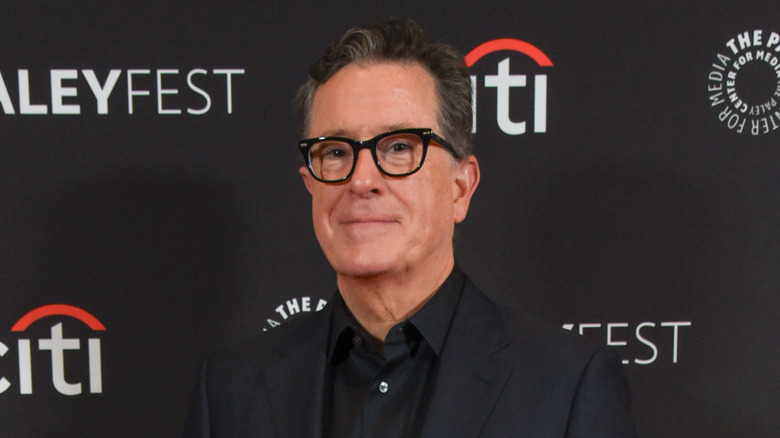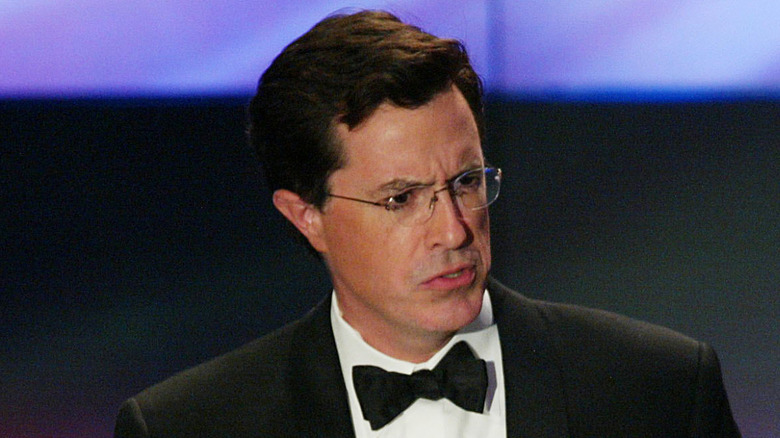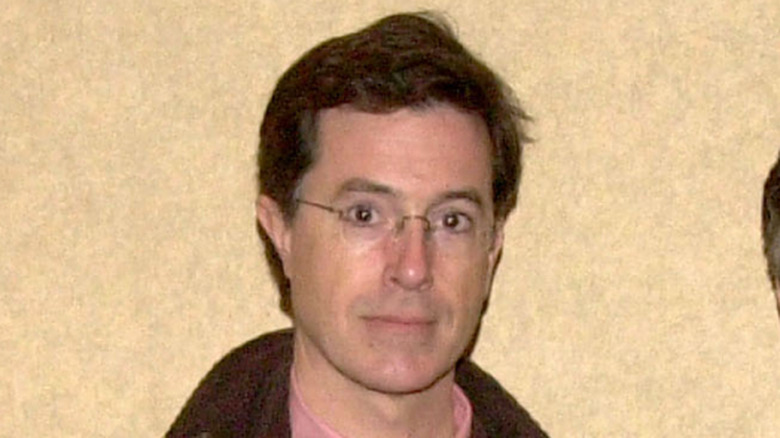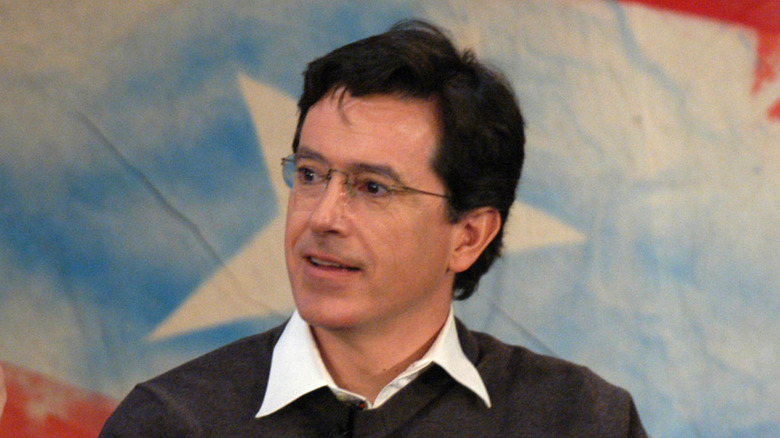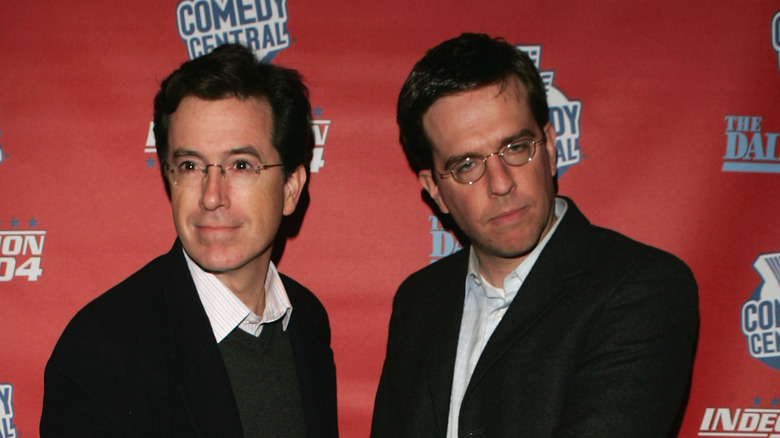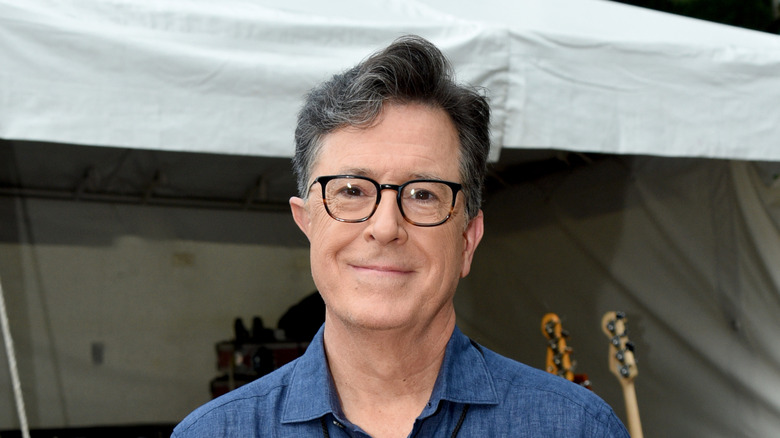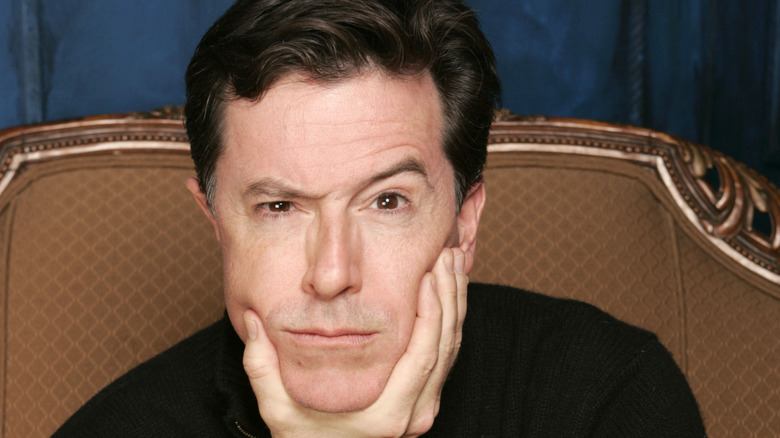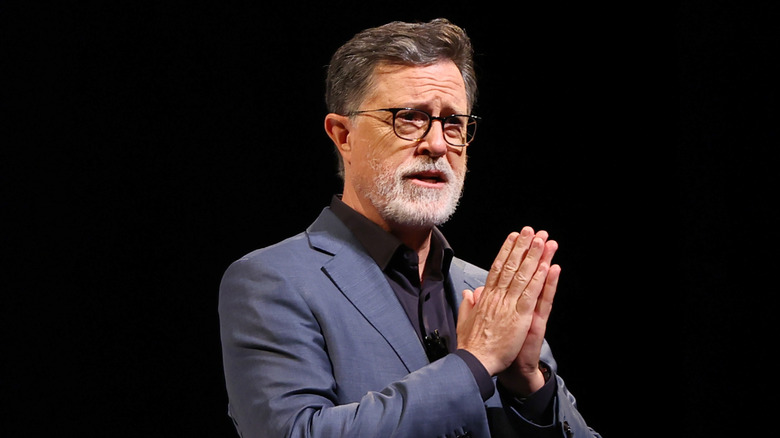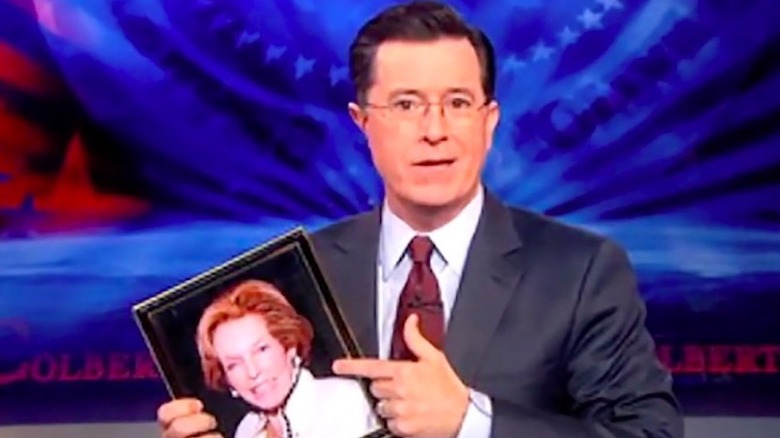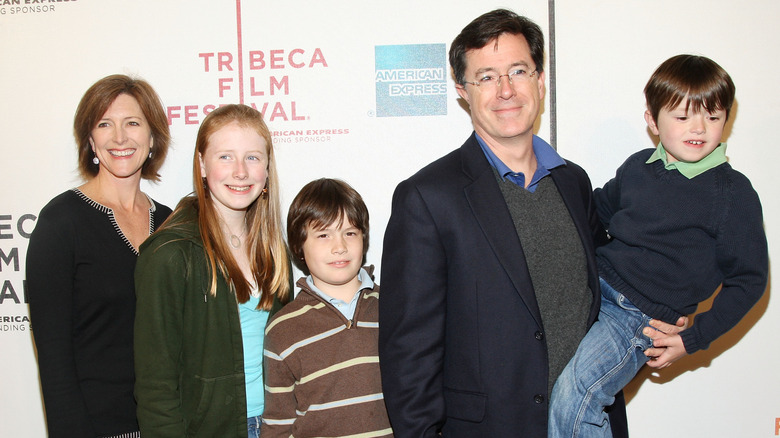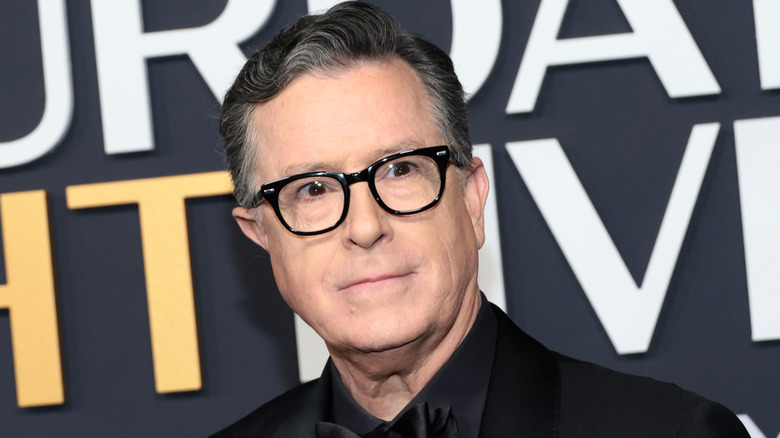The Tragic Real Life Story Of Stephen Colbert
The image of the sad clown, laughing on the outside while crying on the inside, has become so prevalent that it's practically become cliché. Yet, as is the case with many clichés, there's an underlying truth. In fact, the so-called "sad clown paradox" has actually been the focus of scientific study, exploring how the likes of beloved comedian Robin Williams, Spike Milligan of Britain's "The Goon Show," and "Friends" star Matthew Perry were plagued with crippling depression while bringing laughter to the world.
To a certain extent, the same can be said of Stephen Colbert. He came to prominence as a deadpan correspondent alongside host Jon Stewart on "The Daily Show," before spinning himself as a one-man parody of Fox News in Comedy Central hit "The Colbert Report," which launched in 2005 and ran for more than 1,300 episodes until concluding in 2014. That, however, was just the beginning; when late-night trailblazer David Letterman stepped down from "The Late Show," Colbert was tapped to become its new host, a role he took on in 2015.
While he's undeniably one of the funniest performers on television, scratching the surface reveals that Colbert has experienced significant sadness and heartbreak over the years, beginning with a horrific childhood accident that came to shape his life in ways he'd only come to understand years later. To find out more about the darker side of this famed funnyman, read on for an exploration of the tragic real-life story of Stephen Colbert.
A tragic plane crash shattered his life when he was just 10
The youngest of 11 children, Stephen Colbert was just 10 years old when tragedy struck. In September 1974, An airplane carrying his father, James Colbert, and two older brothers, Peter and Paul, crashed in a North Carolina cornfield. All three perished in the crash. Suddenly, what had been a happy childhood became permeated by grief and loss.
Colbert revisited that traumatic childhood incident when he appeared on "Oprah's Next Chapter," telling Oprah Winfrey — who'd likewise experienced tragedy within her own life — about how losing his father and brothers at such a young age came to define him. "For years, I sort of thought that that was my secret name," Colbert observed. "That that loss was my name ... that's a name that no one can ever truly pronounce, because that's who you are."
Colbert later sat down to discuss grief with CNN anchor Anderson Cooper, no stranger to tragedy himself after losing his father when he was a child. In that CNN interview, Colbert explained he felt that there was another Stephen Colbert, an alternate-universe version who hadn't experienced that heartbreaking loss. "There's that kid before my father and my brothers died," he shared.
Stephen Colbert's childhood was a lonely one
Following the tragic 1974 deaths of Stephen Colbert's father and two brothers, his other siblings had either gone to college or were engaged in their own lives, leaving Colbert essentially alone with his mother, both grieving that same loss in their own ways. "I was personally shattered," he told Anderson Cooper. "And then you kind of reform yourself in this quiet grieving world that was created in the house ... It became a very quiet house, very dark."
Colbert also remembered that grim period when interviewed for GQ. "I was left alone a lot after Dad and the boys died. And it was just me and Mom for a long time," he said. Watching his mother's stoicism in the face of losing two sons and her husband in one fell swoop taught him a lesson he didn't realize he was learning. "By her example am I not bitter," he explained. "By her example. She was not. Broken, yes. Bitter, no."
Isolated and lonely, young Colbert retreated into himself, and books became a solace. He was, he recalled, a voracious reader, losing himself in the endless stream of books that he relentlessly plowed through. He said that he completed a new book each day, confirming that every penny of his allowance went to purchasing books. "Every birthday, confirmation, Christmas — books, please, stacks of books."
His relationship with his mother was codependent and unhealthy
Being essentially alone with his grieving mother during the years after his father and brothers died was certainly not a happy memory for Stephen Colbert. In fact, looking back at his childhood he'd come to understand that his relationship with his mother at that time was unhealthy and codependent.
"And my mother had me to take care of, which I think was sort of a gift for her, it was a sense of purpose at that point because I was the last child," Colbert observed when interviewed by Anderson Cooper for CNN, but noted that this care went both ways, and he felt a duty to her as well. This tight relationship with his mother, however, led to the typical pursuits of childhood falling by the wayside. "I had a different point of view than the children around me," he admitted.
One way in which Colbert could comfort his mother was to make her laugh. "I think I did my best to cheer my mom up," Colbert recalled when interviewed for "60 Minutes." Years later, Colbert realized the reason he'd become drawn to comedy was because of this desire to lift her out of her grief, even temporarily. "I think there's no doubt that I do what I do because I wanted to make her happy. No doubt," Colbert said during an appearance on "The Howard Stern Show."
The death of his father and brothers left him feeling 'shut off'
It was only with the passage of time that Stephen Colbert came to realize that he hadn't really grieved the loss of his father and brothers. "Nothing made any sense after my father and my brothers died. I kind of just shut off," Colbert recalled in an interview with The Post and Courier. He described feeling a detachment from peers, especially as a child. It didn't negatively permeate his view towards others, but there was a real struggle to connect, he told interviewer Morley Safer when interviewed for the venerable CBS newsmagazine show "60 Minutes."
When Colbert went away to college, however, the depth of that loss hit him like the proverbial ton of bricks. He recalled his poor state when appearing on "Oprah's Next Chapter," revealing that he experienced a drastic weight loss during his freshman year, entering college at about 185 pounds and then dropping to 135 pounds. He attributed that to the fact that he suddenly found himself with the time to finally process his grief, nearly a decade after the fact. "I finally had time to sort of be alone with the idea," he added. "I got very sad about it."
He became deaf in one ear due to botched surgery
One distinctive aspect about Stephen Colbert's physical appearance is his right ear, which bends outward at a different angle than his left. Fans, however, might not realize that he's completely deaf in that ear, the result of a botched surgical procedure on his eardrum. "I had this weird tumor as a kid, and they scooped it out with a melon baller," he jokingly recalled when interviewed by The New Yorker in 2005.
He continued the jokes about his deaf ear in one of his "Late Show" monologues, describing his non-functioning ear as just "a prop," insisting that his ear simply does not function. "It's all gone," he said. "Nothing in here."
Interestingly, that surgical mishap may have inadvertently been responsible for his career in comedy, scuttling his early interest in becoming a marine biologist. "I have no ear drum," he told The Post and Courier. "So I had this operation at the Medical University when I was a kid. Now I can't get my head wet. I mean, I can, but I can't really scuba dive or anything like that. So that killed my marine biology hopes."
He experienced severe anxiety early in his career
In retrospect, it almost seems as if Stephen Colbert's rise to the highest echelons of the comedy pantheon was inevitable. Colbert, however, certainly didn't feel that when he was just beginning his career as an actor. As he told Rolling Stone, he and wife Evelyn had recently married, and his lack of success gnawed at him. "I had a bit of a nervous breakdown after I got married — kind of panic attacks," Colbert recalled. He remembered the days when Evelyn would return home from her day on the job and ask what he'd done that day. "And I'd say, 'You're looking at it.' Just tight circles around the couch," he said.
Things became so bad that he sought medical attention, which resulted in a prescription for Xanax. The anti-anxiety drug actually worked — until Colbert realized the medication wasn't actually helping him deal with his anxiety, it was simply a Band-Aid that tamped it down enough so that he could function. It was then that he discovered the only time his anxiety actually did vanish was when he performed onstage. "Like, 'Oh, you feel fine when you're out here.' And then as soon as I got offstage, I'd just crumble into a ball again," he added.
The tragedy he'd experienced as a child led him to lose his faith
Stephen Colbert was raised Catholic, and his faith has been a touchstone throughout his life. His Catholicism, he explained during an appearance on "The Spiritual Life with Fr. James Martin, S.J.," was an intrinsic part of him. "You cannot remove that from me anymore than you can remove the marble from a statue," he said. "That's just who I am."
That said, Colbert's journey of faith has not always been smooth. In a previous interview with Martin, for the podcast "Faith in Focus," he spoke candidly of how the loss of his father and brothers brought him to a crisis of faith. He recalled being 22 years old, and turning his back on religion, explaining that he was "convicted of my own atheism, and had lost my faith in God."
Then, one day, someone on a Chicago street handed him a small copy of the Psalms and Proverbs from the New Testament. He opened it up, looked at the glossary and saw suggested verses addressing anxiety. He turned a passage taken from Jesus' Sermon on the Mount, which essentially insisted there was no point in worrying. "And I was absolutely, immediately, lightened," Colbert said. He felt he intimately and intrinsically understood the lines, and this deeply affected him. He stood on the street, on a bitterly cold day, and read the sermon in its entirety. "And my life has never been the same," Colbert added.
Stephen Colbert shared his grief with TV viewers after his mother's death
In 2013, Stephen Colbert took a brief hiatus from "The Colbert Report" after the death of his mother, Lorna Elizabeth Tuck, at age 92. When he returned to the show, he broke character to make what was, for that show, a rare appearance as his actual self and not the self-deluded blowhard he portrayed.
The reason for that was to deliver a heartfelt eulogy to his late mother, revealing that she'd originally trained to be an actor, and was responsible for the love of theater that would eventually propel him to pursue his own showbiz dreams. "And she would teach us how to do stage falls by pretending to faint on the kitchen floor," he told viewers.
Becoming visibly emotional as he fought back tears, Colbert recounted how much his mother lived vicariously through her children. "We were the light of her life, and she let us know it til the end," he added, before continuing on with the show. At the episode's end, he offered one final tribute when he placed his hand on his forehead and performed a faux faint — just like she'd taught him all those years ago.
Becoming a father reignited old childhood traumas
Stephen Colbert and wife Evelyn eventually started a family, and are the parents of three children. Interestingly, Colbert found that the experience of becoming a father filled him with an array of emotions — some of which triggered the childhood tragedy he'd experienced when he was just 10.
Interestingly, Colbert revealed that the first time he held his first child as a newborn, he was hit with the inevitability that life is finite. "The first thing that occurred to me was, How beautiful and how wrong that this will ever end," he observed while appearing on a 2022 edition of CNN's podcast, "All There Is with Anderson Cooper."
During that podcast, Colbert also recalled that, as both he and his children grew older, he'd started counting down the days as his own age drew closer to that of his father when he'd died. "And then the day I was one day older than my father ever was," he said, revealing that on that day he did something special with each of his children — which required some air travel, given that one child was still living at home, while the other two were attending different universities. "I just showed up," he said. "Like I flew around the country ... and none of them asked me why I was there."
He nearly died after an unexpected attack of appendicitis
Late 2023 was an unexpectedly dire time for Stephen Colbert when he experienced a health scare that could have proven fatal. He'd been off for awhile, with reruns of "The Late Show" filling in until he finally returned. At the start of his return episode, Colbert revealed that the last time viewers had seen him behind his talk show desk he'd been in great distress — but had no idea just how serious it was.
Colbert proceeded to recount what had taken place, explaining he'd awoken that morning to agonizing abdominal pain. When it began to subside, he figured it would go away on its own. Instead, it grew increasingly worse as the day wore on. Ever the trouper, however, Colbert decided to soldier on through the discomfort and tape two back-to-back shows — even dancing with celebrity chef José Andrés — until the second show had wrapped. But he wasn't doing well. "I've got a raging fever, I'm shaking like a Polaroid picture with the DTs," Colbert recalled.
On his wife's advice, he agreed to go to a hospital, and the prognosis was grim. "They scan me and it turns out my appendix had already burst," he said, jokingly adding, "They said when they opened me up, it was like they'd shot 'John Wick 5' down there." Surgeons quickly removed his ruptured appendix and thoroughly cleaned out the infected area, and he'd spent the weeks after that recovering.
He was left reeling by the surprise cancellation of The Late Show
It's no secret that the reach of network television has been diminishing, as have ratings for the late-night shows that populate them. That said, Stephen Colbert's "Late Show" ruled its timeslot, topping the 11:35 p.m. hour with average viewership of 2.42 million during the second quarter of 2025. In doing so, Colbert had become one of the most cutting critics of President Donald Trump, continually skewering the arguably thin-skinned former reality star. In 2024, Trump had called for Colbert's show to be taken off the air — and the following year, that came to pass when CBS announced plans to not renew "The Late Show" when Colbert's contract ended in 2026.
With Skydance Media in the process of acquiring Paramount (the CBS network is under Paramount's corporate umbrella), approval was required from the Federal Communications Commission for the deal to go through. Eyebrows were raised about the timing, given how critical Colbert had been of Paramount settling a lawsuit launched by Trump, over his complaints of how a "60 Minutes" interview was edited. The network, however, insisted that financial considerations were the reason for its decision to cancel Colbert's show, with a CBS statement claiming it had nothing to do with "the show's performance, content or other matters happening at Paramount."
When Colbert shared the bad news with viewers, he didn't bring up the curious timing. "I'm not being replaced — this is all just going away," he simply said.
Grief has been his constant companion throughout life
Stephen Colbert turned 61 years old in 2025, placing a solid five decades between the present and the tragic loss he suffered at age 10. Despite all the years that had passed, the grief he felt about the deaths of his father and older brothers never truly left him. "Grief is its own thing," he mused in a 2012 interview with Playboy. "It's not like it's in me and I'm going to deal with it. It's a thing, and you have to be OK with its presence. If you try to ignore it, it will be like a wolf at your door."
Reflecting on the subject while appearing on CNN's "All There Is with Anderson Cooper," Colbert recalled the time he was walking down a street and suddenly became overwhelmed with gratitude for the pain that he'd experienced as a result of his grief. While that may seem counterintuitive, he explained that if one feels true gratitude for the good things in life, one must be equally grateful for the bad — or, in his case, the worst thing that had ever happened to him. "That if I can be grateful for my life, am I also grateful for this?" he observed. "Yes, I am also grateful for this."
